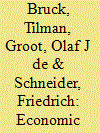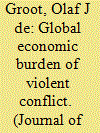|
|
|
Sort Order |
|
|
|
Items / Page
|
|
|
|
|
|
|
| Srl | Item |
| 1 |
ID:
109196


|
|
|
|
|
| Publication |
2011.
|
| Summary/Abstract |
In this article, we estimate the total costs of the German participation in the Afghanistan war, both past and future. This is a hugely complex and uncertain calculation, which depends on several important assumptions. These assumptions pertain to the different cost channels and the shares of these channels that can be attributed to the German participation in the war. By calculating the costs of the German participation, we provide a framework for other researchers to do the same with respect to other countries. The article can function as a roadmap for researchers focusing on this topic. In the end we find that, in the most realistic of several possible scenarios regarding the duration and intensity of the German participation in the war in Afghanistan, the German share of the net present value of the total costs of the war ranges from 26 billion Euro to 47 billion Euro. This large range reflects the uncertainties with which the costs must be estimated. On an annual basis, we estimate that the German participation in the war costs between 2.5 and 3 billion Euro. This contrasts with the official war budget, which is little over 1 billion Euro for 2010, showing that governments may not adequately represent the costs of military action.
|
|
|
|
|
|
|
|
|
|
|
|
|
|
|
|
| 2 |
ID:
184204


|
|
|
|
|
| Summary/Abstract |
Calculating the consequences of global public bads such as climate change or pandemics helps uncover the scale, distribution and structure of their economic burdens. As violent conflict affects billions of people worldwide, whether directly or indirectly, this article sets out to estimate its global macro-economic repercussions. Using a novel methodology that accounts for multiple dimensions of war, the article finds that, in the absence of violent conflict since 1970, the level of global GDP in 2014 would have been, on average, 12% higher. When disaggregating these results by conflict type, civil conflicts are estimated to have been the costliest by far. Income growth is found to be altered up to four years following the end of a conflict, although the direction of this relationship depends on the intensity and type of conflict. Countries also suffer significantly from fighting in neighbouring countries, thereby showing the importance of mitigating spillovers rapidly. The largest absolute losses associated with violence emanate from Asia, while many high-income economies are found to benefit economically from participating in conflicts on foreign soil. This analysis thus shows that, despite some evidence of a faster post-conflict growth and possible benefits for external participants, violent conflict leads to net global losses that linger long after peace is achieved, reducing the peace dividend. The article concludes by discussing public policy options to strengthen the benefits of peace as a global public good.
|
|
|
|
|
|
|
|
|
|
|
|
|
|
|
|
| 3 |
ID:
076426


|
|
|
|
|
| Publication |
2007.
|
| Summary/Abstract |
While the general argument that it is easier and more cost-effective to prevent conflicts before the outbreak of violence has considerable attraction, a rigorous approach to estimating the cost and benefits of this policy is still lacking. The objective of this study is to contribute to the development of such an approach. The project involves six case studies, three retrospective (the Western Balkans, Afghanistan, and Rwanda) and three prospective (Afghanistan, Uzbekistan and southern Sudan). Its main conclusion is that targeted programmes of conflict prevention are (or would have been) significantly cheaper than cure.
|
|
|
|
|
|
|
|
|
|
|
|
|
|
|
|
|
|
|
|
|